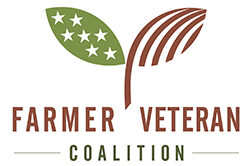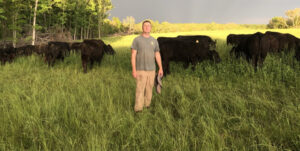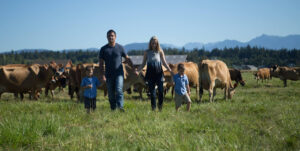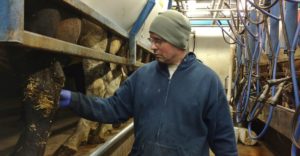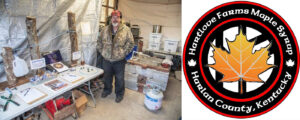Written by Evan Eagan
Photos by Susanna Frohman
Nate Looney is not your typical farmer.
Young, fit and full of enthusiasm, he bears few similarities with an aging farming population that is dwindling with each new harvest.
Looney, however, is part of a new wave of veterans embarking on careers in agriculture after returning home from serving their country overseas.
“Food is the next great war,” Looney said in a serious tone. “Food security in general, and penetrating food deserts is an all-encompassing battle. Who better to fight than seasoned soldiers? We understand duty, service and dedication in the same way that our current aging farming population does. We, as veterans, will continue to bear the torch.”
Born and raised in Los Angeles’ Windsor Hills neighborhood, Looney, 31, dreamed of serving in the armed forces since he was a child. At the age of 18, during his freshman year of college at San Francisco State University, he decided it was time to challenge himself, so he joined the National Guard to gain “real world experience and opportunities to grow as a leader.”
Serving as a military policeman assigned to the 239th Military Police Company in the Louisiana National Guard, Looney quickly found the challenge he was seeking. In 2005, amidst the deadliest natural disaster in recent U.S. history, his unit was activated to assist local law enforcement with evacuation, and law and order operations in support of Hurricane Katrina.
“Honestly, I never expected to see destruction and devastation to that magnitude in the United States,” he said. “The devastation was sweeping. During the storm, roads became raging rivers and there was debris flying in the air. After the storm, the devastation was more apparent in the faces of survivors that came to the Superdome for refuge.”
Looney’s unit remained activated for six months after the storm, and would eventually be re-activated to alleviate the manpower issues New Orleans Police Department was facing. His unit served this role for two years, a testament to how dire the situation remained in New Orleans post-Katrina.
Then, in 2008, while serving with the 2228th Military Police Company, Looney deployed to Iraq’s Al Anbar Province where his unit served as the private security detail for high-ranking military officials and VIPs.
“When I think about being in Iraq, I think about the parallels in destruction I saw in New Orleans after Katrina,” he said. “Coming off two years patrolling the streets of New Orleans, I felt that all I experienced not only solidified my sense of duty, but also prepared me to serve my country in Iraq.”
After eight years of honorable service, Looney separated from the National Guard in 2011 with plans to transition into a civilian police force, but a shattered economy and rampant hiring freezes led him to a stint as a real estate agent. The real estate market wasn’t any better, so, with the encouragement from mentors, he decided to go back to school, this time at American Jewish University, where he earned a degree in business.
During his senior year, Looney became interested in agriculture, particularly the area of urban farming and conservation. During this time, he began growing vegetables as a hobby and was fascinated by the growth process.
“I focused on researching urban agriculture and drought tolerant edible solutions, which further led me to aquaponics where we use 90% less water to grow food in a fraction of the time and fraction of the space needed for traditional growing methods,” he said. “I was off to the races.”
Though this was Looney’s first foray into agriculture, farming isn’t just a passion for him, it’s in his blood. Looney comes from a long line of farmers. His great-great-great grandparents were slaves who, after gaining their freedom, cleared approximately 240 acres in northern Louisiana and established a farm that is still family operated today.
Despite Looney’s lineage to farming, it did not become his sole focus until September 2015 when he reached out to Farmer Veteran Coalition about an opportunity at Ouroboros Farms, a commercial aquaponics and permaculture farm in Half Moon Bay, California.
Thanks to funding from The San Francisco Foundation, a leading agent of philanthropy in the Bay Area, Farmer Veteran Coalition was able to develop a three-month program with Ouroboros Farms, where Looney learned about aquaponics while living in San Francisco and receiving a stipend to help with expenses.
“This was a really great opportunity for me,” said Looney. “Having the chance to learn hands-on for three months at Ouroboros Farms gave me the opportunity to learn the ins and outs of running a commercial aquaponics farm, in addition to giving me invaluable industry experience. More than anything, working with FVC and Ouroboros gave me the confidence to pursue my endeavors as an aquaponics urban farmer.”
Having finished the aquaponics program at Ouroboros in February, Looney is focused on refining his business plan and launching Westside Urban Gardens, an urban aquaponics-based agribusiness in Los Angeles.
For veterans considering a career in agriculture, Looney recommends trying it out to see if it is the right fit.
“Just start growing stuff,” he said. “The sooner you start, the sooner you’ll figure out whether or not agriculture is right for you. If it is, pretty quickly you’ll start to figure out the right direction. The learning curve in the agricultural industry can be steep, so the sooner you get started, the further ahead you’ll be.”
